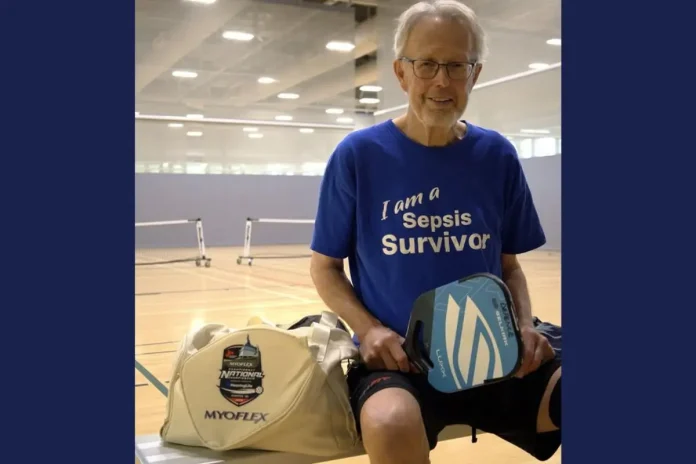Pickleball Champion Sepsis Survivor: Winnipeg resident Mac Horsburgh nearly lost his life to sepsis nine years ago, but he survived against the odds and now advocates for awareness while competing in pickleball tournaments. Recently, he won a national gold medal, adding to his journey of recovery and purpose.
A Life-Threatening Illness
Horsburgh’s health crisis began with a cyst on his finger that became infected. After several doctor visits and a late diagnosis of cellulitis, the infection spread. One night, he collapsed at home after dinner with his mother. The infection caused a ruptured aneurysm, and he was rushed to St. Boniface Hospital.
He spent three weeks in intensive care, including 10 days in a medically induced coma. During this time, doctors told his wife, Laura Roberts, that he had only a 25 percent chance of survival and asked her to sign a do not resuscitate order. “I broke down,” she said. “I started crying… that was really when it obviously hit me.”
Family Strength
Roberts, who had survived breast cancer two years earlier, drew on her experience to fight for her husband. After her own insistence on testing had saved her life, she was determined not to give up on him. “If I hadn’t advocated for myself at that point, it would’ve gone on,” she said. “I think that kind of helped (with Horsburgh).”
She visited him daily, speaking with medical staff. “I need to stay positive, because I need this team to stay positive,” she said of her approach.
Their youngest son, Carson, then 19, faced his own challenge. On the day his father was placed in a coma, he had to write a university exam. Both he and Roberts later sought counseling. “It had a huge impact on both of them,” said Horsburgh.
Recovery and Struggles
When Horsburgh woke up, he could not sit or stand without difficulty. Over time, he regained strength by walking short distances, from one tree to another, until he managed full blocks.
Months later, he learned he had been in septic shock. “The word sepsis was never used when I was in the hospital,” Horsburgh said. He added: “One of the struggles when you recover from sepsis is trying to make sense of what happened to you.”
After his release, he developed Post-Traumatic Stress Disorder (PTSD). “I was dealing with a lot of emotions that I’d never encountered before,” said Horsburgh. “One being rage about what happened to me and the other one being ecstatic to be alive. It was difficult for my wife and my family to see me like that.”
Roberts explained how the trauma affected them all. “Our whole family had PTSD to be perfectly honest,” she said. “Once you’re discharged, you’re kind of on your own. We weren’t really kind of told that this is going to happen, so that was hard for him.”
Finding Pickleball
Five years ago, Horsburgh and Carson discovered pickleball at the Reh-Fit Centre. A former tennis and handball player, Horsburgh was instantly drawn to the game. “I essentially got hooked,” he said. “It was just a perfect fit for me in terms of my previous sports background.”
He had played tennis at Dalhousie University, winning the Atlantic University Sport championship in 1973, and competed in handball into his forties. With pickleball, he began competing again and soon earned medals.
Earlier this year, he won silver in a provincial event. At nationals, he faced David Adamson, the same player who beat him earlier, and won gold. “For me, it was a new experience to get up on that podium,” he said. “I feel very fortunate and gratified to have won that medal.”
Sepsis Advocacy
Horsburgh now speaks out about sepsis, urging people to act quickly. The Canadian Sepsis Foundation defines sepsis as a “life-threatening condition that occurs when the body’s response to an infection injures its own tissues and organs.” It is one of Canada’s most preventable causes of death, linked to one in 18 deaths.
“One of the biggest issues for a sepsis survivor is trying to get resources and information,” Horsburgh said. “There was absolutely nothing for me when I got out of the hospital.”
Driving Research
Ryan Zarychanski, professor of medicine at the University of Manitoba, praised Horsburgh’s efforts. “Mac is definitely a very special individual,” he said. “He suffered greatly with a severe infection that almost cost him his life, and he turned that really serious and life-changing event into one that has brought much spotlight into the importance of recognizing infection early in individuals and providing prompt diagnosis and treatment.”
He added: “It’s been a tremendous experience to work with Mac. Truthfully I’ve learned as much from Mac as I hope we’ve been able to contribute back to the field of medicine.”
Roberts also noted how advocacy helped her husband heal. “All the advocacy work that he’s done I think really helped him deal with everything that happened with him,” she said.
Looking Ahead
Horsburgh continues to compete, with tournaments scheduled in Gimli this month and in Arborg in October. For him, pickleball is more than a sport. “Pickleball was really a bit of a lifesaver for me, too,” he said. “It gave me an opportunity to be active again. I feel like I’m not playing singles pickleball for myself, I’m playing for sepsis survivors.”
News in Brief: Pickleball Champion Sepsis Survivor
Winnipeg’s Mac Horsburgh survived septic shock after being given only a 25 percent chance of survival. Now, he is a pickleball player, national gold medalist, and advocate for sepsis awareness. His story shows the importance of fast action, family support, and resilience in the face of life-threatening illness.
ALSO READ: Beer City Open Sets the Gold Standard for Amateur Pickleball Tournaments Nationwide

